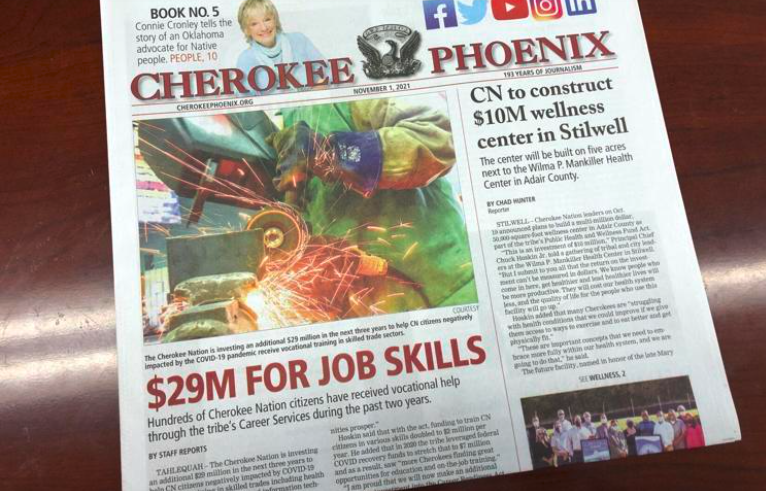
- Details
- By Chuck Hoskin Jr
Guest Opinion. Informed citizens are crucial for Cherokee democracy. The Cherokee Nation best serves the Cherokee people when we have open and transparent communication and when citizens can access truthful information about what their government is doing. Besides, Cherokees have an inherent right to monitor their tribal government.
To support that ideal, we are expanding the Cherokee Nation Free Phoenix for All Program. This collaboration with the Cherokee Phoenix newspaper provides a free one-year subscription to any citizen who opts in through the tribe’s online Gadugi portal. The one-year Cherokee Phoenix subscription can be mailed anywhere in the country at no cost to subscribers.
A year ago, Deputy Chief Bryan Warner, the Council of the Cherokee Nation, the Cherokee Phoenix and I worked together to start this free subscription program. We knew that informing Cherokees about the COVID-19 pandemic and providing relevant, factual and timely information was critical for keeping our people safe and helping our communities recover and rebuild. Today, we want to offer the service again in order to ensure citizens remain engaged and informed.
We hope this will provide people with even more access to our government through the news source that follows our government and our people more closely than any other, the Cherokee Phoenix. Since its establishment in 1828 as the first newspaper published by Native Americans in the United States, the Cherokee Phoenix has empowered Cherokees and informed others all over the country and world about our great Nation. The Phoenix has played an essential role throughout our history when we most needed to communicate well among ourselves and to the outside world about the value of the Cherokee democracy.
The Cherokee Nation has long been a leader in government transparency, and this is one more way we are strategically working to increase that transparency. The newspaper has a legacy of providing an unbiased perspective about the Cherokee Nation. It is an independent media source whose mission is to inform and educate readers about important local, state and national issues that potentially affect the tribe and our citizens.
Cherokee Nation funds the newspaper, but Cherokee law also provides legal protections to keep the newspaper separate from the government. The Cherokee Phoenix is overseen by an independent editorial board and is completely separate from the tribe’s public relations and communications arm. This structure allows the Phoenix to provide unbiased scrutiny and creates a platform where citizens can speak out, whether in a letter to the editor or the Cherokee Phoenix social media pages.
Cherokee Nation is one of only a few tribes that have passed freedom of the press acts. Protecting a free and independent press is vital because it holds our elected leaders accountable. That was true before my tenure and will continue long after my term as Principal Chief. And that’s how it should be, because well-executed journalism ultimately strengthens tribal sovereignty and self-determination.

Besides being Indian Country’s oldest independent newspaper, the Cherokee Phoenix was also the first newspaper published in a Native American language. To this day, the Phoenix is a valuable resource for perpetuating our language, whether by helping first-language Cherokee speakers stay informed or giving language-learners plenty of material to practice with. Just as the Phoenix played a key role in the survival of our Nation, today it is key to the survival of our language.
I encourage all citizens to sign up on the Gadugi portal, at gadugiportal.cherokee.org, for the Cherokee Nation Free Phoenix for All Program. You’ll receive the latest information about tribal programs and events, Cherokee communities, and the achievements of talented Cherokees on our reservation and all over the world. The subscription is limited to one per household, and the deadline is Nov. 30.
For more information or assistance with the Gadugi portal, call 918-453-5058 or email [email protected].
Chuck Hoskin, Jr. is the principal chief of the Cherokee Nation.
More Stories Like This
The Absence of October's Job Report Shows Why Native American Communities Need Better DataTribal IDs Are Federally Recognized. ICE Agents Are Ignoring Them.
Thanksgiving: Part of "Broken Circle Holiday"
Thanksgiving is a Tradition. It's Also a Lie
Decisions About Us, Without Us: Education Dismantling Ignores Tribal Nations
Help us defend tribal sovereignty.
At Native News Online, our mission is rooted in telling the stories that strengthen sovereignty and uplift Indigenous voices — not just at year’s end, but every single day.
Because of your generosity last year, we were able to keep our reporters on the ground in tribal communities, at national gatherings and in the halls of Congress — covering the issues that matter most to Indian Country: sovereignty, culture, education, health and economic opportunity.
That support sustained us through a tough year in 2025. Now, as we look to the year ahead, we need your help right now to ensure warrior journalism remains strong — reporting that defends tribal sovereignty, amplifies Native truth, and holds power accountable.
 The stakes couldn't be higher. Your support keeps Native voices heard, Native stories told and Native sovereignty defended.
The stakes couldn't be higher. Your support keeps Native voices heard, Native stories told and Native sovereignty defended.
Stand with Warrior Journalism today.
Levi Rickert (Potawatomi), Editor & Publisher

